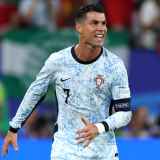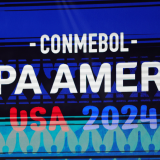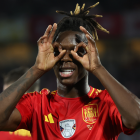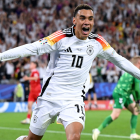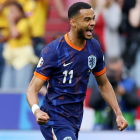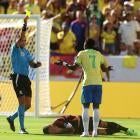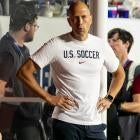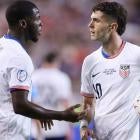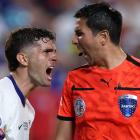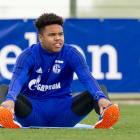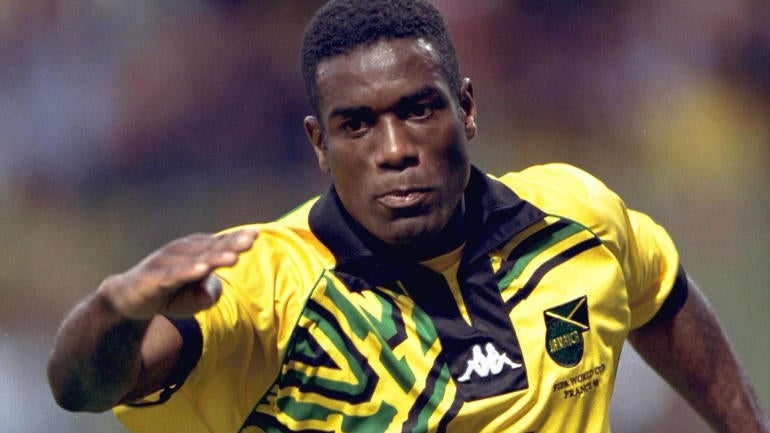
Robbie Earle will never forget the moment he entered the pitch at the 1998 World Cup as Jamaica made their historic debut in the tournament. Born and raised in England from Jamaican parents, the natural, initial choice was to represent the Three Lions, but when he finally decided to play for the Reggae Boyz -- a callup he accepted at the age of 32 -- it gave him a tremendous sense of honor.
"I think the biggest word for me was pride," says Earle. "I've been in a couple of England squads and it hadn't quite worked for me, and then through my parents, as my parents left the Caribbean to come to England...for a better life, so I was proud to represent them. It was a thank you to them for the sacrifices they have gone through. Obviously, to be the first Caribbean nation to play [at the World Cup] and score a goal was something that stays with you and it's a great bit of history...I think it was a time when we helped put Jamaica on the map a little bit."
Earle, an analyst for NBC Sports and their Premier League coverage, is being modest. He didn't just score a goal. He scored Jamaica's first ever goal at the World Cup and played in every group game, creating quite a memory for the Caribbean nation. Unfortunately, the Reggae Boyz failed to get out of the group but did manage a win thanks to a 2-1 victory over Japan. Both goals were scored by Theodore "Tappa" Whitmore, a friend of Earle and who now manages today's squad, ready to face the USMNT this Thursday.
Craving even more coverage of the world's game? Listen below and follow ¡Qué Golazo! A Daily CBS Soccer Podcast where we take you beyond the pitch and around the globe for commentary, previews, recaps and more.
Earle is happy that Tappa is in charge as it means a huge deal for the country that one of their own is in charge. "It's nice to see a Jamaican manager managing the team," says Earle. "We don't have to feel it's always a European or somebody from outside of the country who can do that. Tappa's done a great job, he's helped develop the system underneath and the team's competitive."
It hasn't come without problems. Just last week, coach Tappa expressed his frustrations in preparation for this game against the U.S. Speaking to Jamaica Observer, the team's manager vented about Jamaica's Football Federation (JFF) and the lack of off-field help, which makes it harder to gear up for this summer's Gold Cup. "I'm not at all pleased with where we are with our preparation for the Gold Cup, which is three months away," said coach Tappa, speaking to the news outlet. "The composition of our squad, which is mainly foreign-based, requires us to get the group together as much as is possible based on the limited FIFA dates before the Gold Cup, so every single opportunity is critical to our preparation."
Visa complications and contractual agreements between the federation and squad players have become a major obstacle for Jamaica, meaning that the team who will face the U.S. is a 19-man roster, which includes 10 foreign-based players, six rookies and nine based domestically (the latter have not played a competitive game in a year).
What's more, in this window, the team doesn't have a physiotherapist or a trainer. Wimbledon's Andrew David Clement will have to stand in as a trainer but there will be no physio against the U.S. "This is unacceptable and unprofessional. My work environment is far from ideal and has been for too long,"Tappa said.
These are just some of the problems that bigger nations fail to understand when it comes to World Cup qualification, international action and how the Caribbean journey is much, much, much harder than most. These smaller countries deserve the same amount of infrastructural aid in order to become stronger competitors and the pure fact is this: Success in the international game -- at least from a structural and developmental perspective -- should offer an even playing field.
Tappa wants a solution to these issues no later than two weeks after this international break. As far as this window goes, it's about looking at the glass half-full.
"We are not balanced, so to speak, in every department," said the head coach. "But a situation arose where we have to go out there and as a technical staff try to put a team out there and hope everybody can try his best and try to get a place in the upcoming Gold Cup and World Cup qualification squads."
Earle can't help but relate to this. When he joined the Jamaican national team, the obstacles to feel recognized were just as notable, that's why making it to the World Cup -- Jamaica's first and only appearance in the men's game -- means so much. It becomes a social sense of success.
"We were backing the country," says Earle. "Economy was up, crime was down. Tourist board was thriving, all because of the football and all because the Reggae Boyz put the spotlight on Jamaica. Often Jamaica can be seen in the wrong light so I thought it was a time we put Jamaica in the good light and a good platform and people could really see its beauty."
In 2019, the Reggae Girlz gave the country this same euphoria when they entered the Women's World Cup for the first time, coincidentally enough, also in France. Earle would love to see the men of today replicate this achievement. Part of the plan is to emulate the dual-national role, which is how Earle got involved in the first place and a strategy that many other nations employ as well.
"It's something Jamaica should do. The U.S. is a great example, the Republic of Ireland have based teams on making sure their talent pool and wherever they can," says Earle, who became a club legend with Port Vale and of course Wimbledon of the 1990's. "And it could be exciting times. When you think of the type of players like Michail Antonio, Raven Morrison, Ivan Toney, Liam Moore….there's a number of players who are probably not going to play international football for England, and they're probably at a stage where they're thinking that the international stage is great and the next level of performance, and they qualify through parents or grandparents. It could be an exciting time ... and I am looking forward to it because it was the opportunity that I got, to play international football and to have the wonderful journey that was the World Cup. With the quality of players we are talking about, it definitely puts Jamaica in a better opportunity to qualify again."
Time will tell if Jamaica indeed makes these calls and most importantly, if players like Michail Antonio and Ivan Toney accept, but one thing is for certain, Jamaica -- the wonderful Reggae Boyz -- with the right support and off-the-pitch development, could maybe, just maybe, become a major disruptor in Concacaf.
Make sure you listen to the full interview with Robbie Earle on ¡Qué Golazo! when it comes out this Thursday ahead of the friendly against the USMNT. We talk a lot more including NBC Sports, covering the Premier League, his thoughts on the season and a reflection on the aforementioned Wimbledon and their iconic "Crazy Gang."

